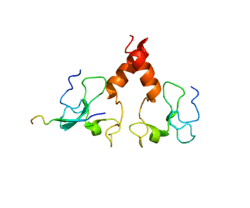PHF21A
| View/Edit Human | View/Edit Mouse |
PHD finger protein 21A is a protein that in humans is encoded by the PHF21A gene.[3][4][5]
Function
BHC80 is a component of a BRAF35 (MIM 605535)/histone deacetylase (HDAC; see MIM 601241) complex (BHC) that mediates repression of neuron-specific genes through the cis-regulatory element known as repressor element-1 (RE1) or neural restrictive silencer (NRS) (Hakimi et al., 2002).[supplied by OMIM][5]
Interactions
PHF21A has been shown to interact with:
References
- ↑ "Human PubMed Reference:".
- ↑ "Mouse PubMed Reference:".
- ↑ Nagase T, Kikuno R, Hattori A, Kondo Y, Okumura K, Ohara O (Feb 2001). "Prediction of the coding sequences of unidentified human genes. XIX. The complete sequences of 100 new cDNA clones from brain which code for large proteins in vitro". DNA Res. 7 (6): 347–55. doi:10.1093/dnares/7.6.347. PMID 11214970. Check date values in:
|year= / |date= mismatch(help) - 1 2 3 4 5 Hakimi MA, Bochar DA, Chenoweth J, Lane WS, Mandel G, Shiekhattar R (May 2002). "A core-BRAF35 complex containing histone deacetylase mediates repression of neuronal-specific genes". Proc. Natl. Acad. Sci. U.S.A. 99 (11): 7420–5. doi:10.1073/pnas.112008599. PMC 124246
 . PMID 12032298.
. PMID 12032298. - 1 2 "Entrez Gene: PHF21A PHD finger protein 21A".
- 1 2 3 4 Iwase S, Januma A, Miyamoto K, Shono N, Honda A, Yanagisawa J, Baba T (Sep 2004). "Characterization of BHC80 in BRAF-HDAC complex, involved in neuron-specific gene repression". Biochem. Biophys. Res. Commun. 322 (2): 601–8. doi:10.1016/j.bbrc.2004.07.163. PMID 15325272.
- ↑ Hakimi MA, Dong Y, Lane WS, Speicher DW, Shiekhattar R (Feb 2003). "A candidate X-linked mental retardation gene is a component of a new family of histone deacetylase-containing complexes". J. Biol. Chem. 278 (9): 7234–9. doi:10.1074/jbc.M208992200. PMID 12493763.
Further reading
- Hakimi MA, Dong Y, Lane WS, Speicher DW, Shiekhattar R (2003). "A candidate X-linked mental retardation gene is a component of a new family of histone deacetylase-containing complexes". J. Biol. Chem. 278 (9): 7234–9. doi:10.1074/jbc.M208992200. PMID 12493763.
- Iwase S, Januma A, Miyamoto K, Shono N, Honda A, Yanagisawa J, Baba T (2004). "Characterization of BHC80 in BRAF-HDAC complex, involved in neuron-specific gene repression". Biochem. Biophys. Res. Commun. 322 (2): 601–8. doi:10.1016/j.bbrc.2004.07.163. PMID 15325272.
- Shi YJ, Matson C, Lan F, Iwase S, Baba T, Shi Y (2005). "Regulation of LSD1 histone demethylase activity by its associated factors". Mol. Cell. 19 (6): 857–64. doi:10.1016/j.molcel.2005.08.027. PMID 16140033.
- Rual JF, Venkatesan K, Hao T, Hirozane-Kishikawa T, Dricot A, Li N, Berriz GF, Gibbons FD, Dreze M, Ayivi-Guedehoussou N, Klitgord N, Simon C, Boxem M, Milstein S, Rosenberg J, Goldberg DS, Zhang LV, Wong SL, Franklin G, Li S, Albala JS, Lim J, Fraughton C, Llamosas E, Cevik S, Bex C, Lamesch P, Sikorski RS, Vandenhaute J, Zoghbi HY, Smolyar A, Bosak S, Sequerra R, Doucette-Stamm L, Cusick ME, Hill DE, Roth FP, Vidal M (2005). "Towards a proteome-scale map of the human protein-protein interaction network". Nature. 437 (7062): 1173–8. doi:10.1038/nature04209. PMID 16189514.
- Hailesellasse Sene K, Porter CJ, Palidwor G, Perez-Iratxeta C, Muro EM, Campbell PA, Rudnicki MA, Andrade-Navarro MA (2007). "Gene function in early mouse embryonic stem cell differentiation". BMC Genomics. 8: 85. doi:10.1186/1471-2164-8-85. PMC 1851713
 . PMID 17394647.
. PMID 17394647.
External links
- PHF21A protein, human at the US National Library of Medicine Medical Subject Headings (MeSH)
This article incorporates text from the United States National Library of Medicine, which is in the public domain.
This article is issued from Wikipedia - version of the 5/20/2016. The text is available under the Creative Commons Attribution/Share Alike but additional terms may apply for the media files.

